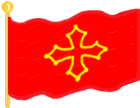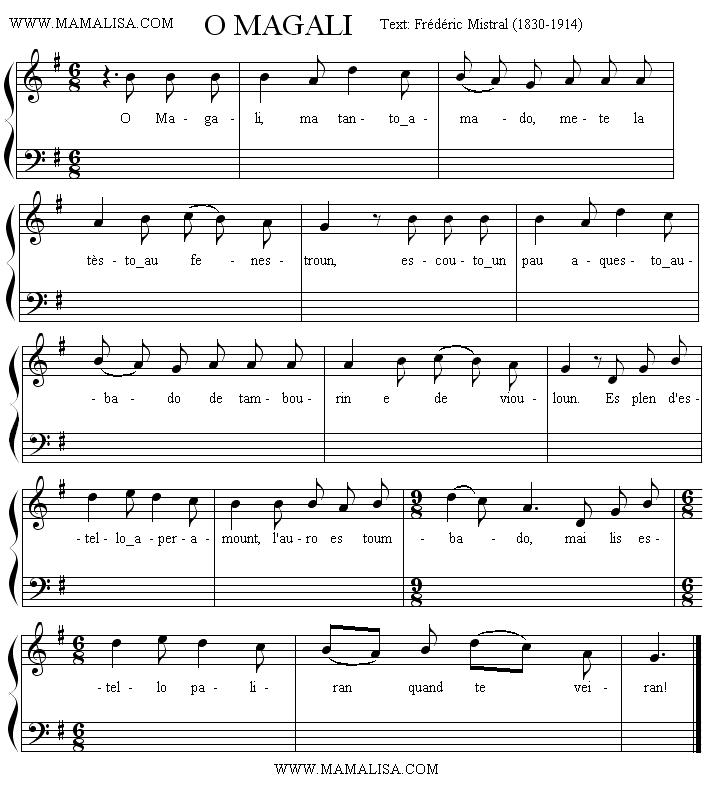O Magali
This song is in the Provençal dialect and written in the Mistralian form (explanation below).
It's the same "metamorphoses" theme as in the French song, Derrière chez ma tante.
O Magali
O Magali
Traditional Song
Traditional Song
(Occitan)
(English)
1- O Magali ma tant amado
Mete la tèsto au fenestroun !
Escouto un pau aquesto aubado
De tambourin e de vióuloun.
- Es plen d'estello, aperamount!
L'auro es toumbado,
Mai lis estello paliran,
Quand te veiran!
2- Pas mai que dóu murmur di broundo,
De toun aubado iéu fau cas!
Mai iéu m'en vau dins la mar bloundo
Me faire anguielo de roucas.
- O Magali! se tu te fas
Lou pèis de l'oundo,
Iéu, lou pescaire me farai,
Te pescarai!
3- Oh! mai, se tu te fas pescaire,
Ti vertoulet quand jitaras,
Iéu me farai l'aucèu voulaire,
M'envoularai dins li campas.
- O Magali, se tu te fas
L'aucèu de l'aire,
Iéu lou cassaire me farai,
Te cassarai.
4- I perdigau, i bouscarido
Se vènes, tu, cala ti las,
Iéu me farai l'erbo flourido
E m'escoundrai dins li pradas
- O Magali, se tu te fas
La margarido,
Iéu l'aigo lindo me farai
T'arrousarai.
5- Se tu te fas l'eigueto lindo
Iéu me farai lou nivoulas
E lèu m'enanarai ansindo
A l'Americo, perabas!
- O Magali, se tu t'envas
Alin in Indo,
L'auro de mar iéu me farai,
Te pourtarai!
6- Se tu te fas la marinado,
Iéu fugirai d'un autre las:
Iéu me farai l'escandihado
Dóu grand soulèu que found lou glas!
- O Magali, se tu te fas
La souleiado,
Lou verd limbert iéu me farai,
E te béurai !
7- Se tu te rèndes l'alabreno
Que se rescound dins lou bartas,
Iéu me rendrai la luno pleno
Que dins la niue fai lume i masc!
- O Magali, se tu te fas
Luno sereno,
Iéu bello nèblo me farai,
T'acatarai.
8- Mai se la nèblo m'enmantello
Tu, pèr acò, noun me tendras ;
Iéu, bello roso vierginello,
M'espandirai dins l'espinas!
- O Magali, se tu te fas
La roso bello,
Lou parpaioun iéu me farai,
Te beisarai.
9- Vai, calignaire, courre, courre!
Jamai, jamai m'agantaras.
Iéu, de la rusco d'un grand roure
Me vestirai dins lou bouscas.
- O Magali, se tu te fas
L'aubre di moure,
Iéu lou clot d'èurre me farai
T'embrassarai!
10- Se me vos prene à la brasseto,
Rèn qu'un vièi chaine arraparas...
Iéu me farai blanco moungeto
Dóu mounastié dóu grans Sant Blas!
- O Magali, se tu te fas
Mounjo blanqueto,
Iéu, capelan, counfessarai,
E t'ausirai!
11- Se dóu couvènt passes li porto,
Tóuti li mounjo trouvaras
Qu'à moun entour saran pèr orto,
Car en susàri me veiras!
- O Magali, se tu te fas
La pauro morto,
Adounc la terro me farai
Aqui t'aurai!
12- Aro coumence enfin de crèire
Que noun me parles en risènt :
Vaqui moun aneloun de vèire
Pèr souvenènço, o bèu jouvènt!
- O Magali me fas de bèn! ...
Mai, tre te veire,
Ve lis estello, o Magali,
Coume an pali!
1. O Magali, my beloved*,
Put your head out the window!
Listen to this sunrise serenade
Of tambourines and violins!
Up there it's full of stars,
The wind has died down,
But the stars will fade
When they see you!
2. No more than the murmuring branches,
Do I care for your sunrise serenade!
But I'm going into the fair sea
To become an eel of the rocks.
O Magali! if you become
A fish in the sea,
I will become a fisherman,
I will fish you!
3. Oh, but if you become a fisherman
When you throw your big fishing nets,
I'll become a flying bird,
I will fly in the fields!
O Magali, if you become
A bird in the air,
I will become a hunter,
I will hunt you!
4. For the partridges, for the warblers,
If you come to set your traps,
I will become the blooming grass
And I will hide in the vast meadows!
O Magali, if you become
A daisy,
I will become clear water,
I will water you!
5. If you become clear water,
I will become a big cloud
And promptly go away
To America, far away over there!
O Magali, if you go away
To far India,
I will become the wind of the sea
I will carry you!
6. If you become the wind of the sea,
I'll fly away to the other side,
I will become the radiance
Of the big sun that melts the ice!
O Magali, if you become
The sunshine,
I will become a green lizard
And I'll drink you up!
7. If you become a salamander
That hides in the thicket,
I will become the full moon
That brings light to the witches in the night!
O Magali, if you become
The quiet moon,
I will become a beautiful mist,
I will hide you!
8. Even if the mist envelops me
You won't hold me thus,
As a beautiful virginal rose
I will blossom in the thorn bush!
O Magali if you become
A beautiful rose,
I will become a butterfly,
I will kiss you!
9. Go, lover, run, run,
You will never, ever catch me,
I will, with the bark of a big oak,
Dress myself up in the dark forest!
O Magali, if you become
A tree on the hills,
I will become an ivy plant
I'll embrace you!
10. If you want to take me in your arms
You'll only hold an old oak,
I will become a white nun
Of the great St. Blaise Monastery!
O Magali, if you become
A white nun
I, as a priest, will be your confessor,
I will hear you!
11. If you go through the convent doors,
You'll find all the nuns
Wandering around me,
For in a shroud you'll see me!
O Magali, if you become
A poor dead person,
Then, I will become the earth
There, I'll have you!
12. Now I begin to believe
That you speak seriously,
Here's my glass ring
As a souvenir, o handsome young man!
O Magali, you do me good!
But, as soon as they saw you,
O Magali, look at the stars,
How they've grown pale!
Notes
*Literally, "my so much loved"
*****
Frédéric Mistral (1830 – 1914) was awarded the Nobel Prize in Literature in 1904 for his work "Mireio" which includes the song "O Magali" at the end of the 3rd Song.
The French translation on our French page was written by the very same author.
Comments
Occitan language has two main written forms:
1. The normalized or classic written form (a.k.a. Alibert's written form) is based on the troubadour spelling - it was modernized at the end of the 19th century and fixed by Louis Alibert in the 1930's.
2. The felibres' written form (a.k.a. Mistralian written form) is based on French spelling - it was fixed by Joseph Roumanille in the second half of the 19th century. It's mainly used in East Occitania (Provence, Nice) and was used by Frederic Mistral –hence the name. The "felibres" were Provençal writers who decided to defend and promote the Provençal language and literature in the 1850's.


Thanks!
Thanks and Acknowledgements
Many thanks to Monique Palomares for contributing and translating this song (with Lisa) and for the comments.
Granmaci!

























